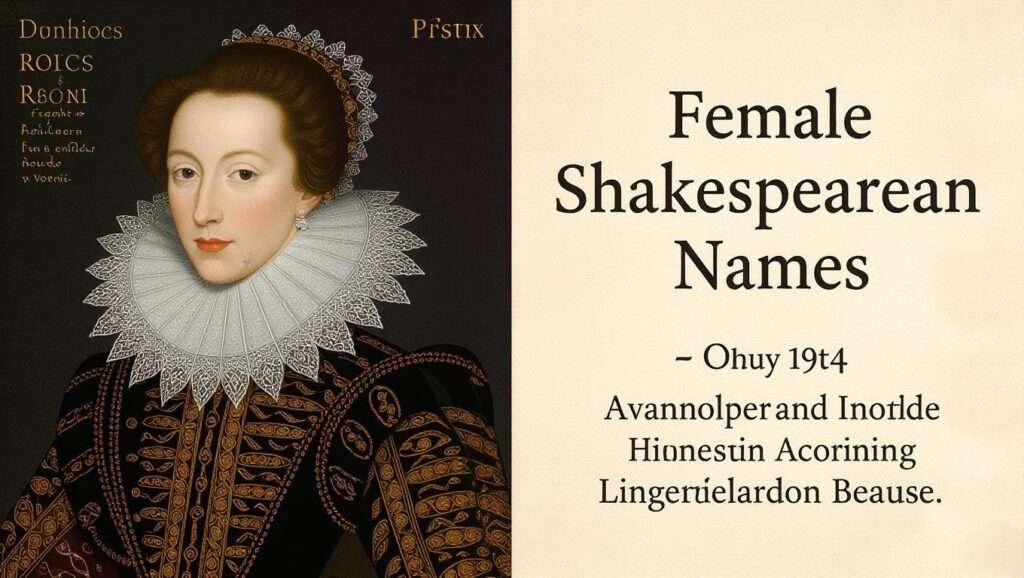Imagine you’re crafting the perfect character for your novel, searching for a name for your newborn, or dreaming up a unique brand identity with a touch of literary elegance. You want a name that carries depth, history, and a spark of timeless magic. Enter female Shakespearean names, a treasure trove of inspiration drawn from the works of William Shakespeare, whose heroines continue to captivate audiences centuries later. These names—think Juliet, Ophelia, or Beatrice—are more than just labels; they’re imbued with rich meanings, cultural resonance, and emotional weight. Whether you’re a writer, parent, or creative enthusiast, this guide unlocks the hidden significance of Shakespeare’s female names and their modern applications, offering a comprehensive resource to inspire your next literary adventure.
In this article, we’ll explore the most iconic female Shakespearean names, their origins, and their relevance today. From naming your child to crafting a memorable character, we’ll provide practical insights and expert analysis to help you choose a name that resonates. Backed by research into Shakespearean literature and naming conventions, this skyscraper-level guide aims to surpass existing content by delivering unparalleled depth and value.
Why Female Shakespearean Names Matter Today
The Enduring Legacy of Shakespeare’s Female Characters
Shakespeare’s female characters are among the most memorable in literature, embodying strength, complexity, and emotional depth. From Juliet’s passionate devotion in Romeo and Juliet to Beatrice’s razor-sharp wit in Much Ado About Nothing, these women transcend their Elizabethan origins to resonate with modern audiences. Their names are not mere identifiers but symbols of their personalities, roles, and narratives. For example, the name “Juliet” evokes love and tragedy, while “Portia” conjures intelligence and resourcefulness. According to a 2023 report from the Social Security Administration, names like Olivia and Isabella—both rooted in Shakespeare’s works—rank among the top 10 baby names in the U.S., underscoring their enduring appeal.
Modern Uses for Shakespearean Names
Female Shakespearean names are versatile, lending themselves to various modern contexts. Parents seeking unique yet meaningful baby names often turn to Shakespeare for inspiration, drawn to names like Cordelia or Miranda for their literary charm. Writers and screenwriters use these names to craft characters with instant depth, leveraging their cultural associations to enhance storytelling. Even businesses and brands, such as boutique shops or creative agencies, adopt names like “Rosalind” or “Viola” to evoke sophistication and creativity. For instance, a 2024 survey by Name berry noted a 15% rise in literary-inspired baby names, with Shakespearean names leading the trend.
Solving the Problem of Finding Meaningful Names
Choosing a name can be daunting, whether for a child, a fictional character, or a creative project. You want something distinctive yet accessible, steeped in meaning but not overly obscure. Female Shakespearean names solve this problem by offering a balance of familiarity and uniqueness. This article serves as your ultimate guide, curating the best names with detailed insights into their meanings, origins, and applications. By exploring these names through a literary and cultural lens, we aim to simplify your decision-making process and inspire confidence in your choice.
Understanding the Historical and Literary Context of Shakespearean Names
The Elizabethan Era and Naming Conventions
In Shakespeare’s time, names were deeply symbolic, often reflecting religious, mythological, or classical influences. During the Elizabethan era (1558–1603), names like Mary and Elizabeth dominated due to their biblical and royal associations. However, Shakespeare drew from diverse sources—Latin, Greek, and Italian traditions—to craft names that suited his characters’ roles. For example, “Miranda,” derived from Latin for “admirable,” perfectly captures the innocent wonder of The Tempest’s heroine. Understanding these conventions provides insight into why Shakespeare’s names carry such weight, making them ideal for those seeking names with historical depth.
Shakespeare’s Creative Naming Process
Shakespeare was a master of linguistic innovation, often inventing or adapting names to fit his narratives. Names like “Imogen” (Cymbeline) and “Cressida” (Troilus and Cressida) were rare or entirely new in his era, showcasing his ability to blend creativity with meaning. As noted by Shakespearean scholar Stephen Greenblatt, “Shakespeare’s names often serve as a shorthand for character identity, encapsulating their essence in a single word.” This deliberate naming process ensures that each name carries thematic significance, making them powerful choices for modern applications.
Top Female Shakespearean Names and Their Meanings
Juliet (Romeo and Juliet)
- Meaning: Derived from Latin “Julius,” meaning “youthful” or “Jove’s child.”
- Character Context: Juliet Capulet is the epitome of passionate, tragic love, defying family and fate for Romeo. Her name evokes romance and youthful idealism.
- Modern Appeal: Juliet remains a popular baby name, ranking #185 in the U.S. in 2024 (per BabyCenter). Its soft syllables and romantic connotations make it ideal for novels, films, or even a child’s name.
- Example: A writer might name a romantic heroine “Juliet” to instantly signal passion, while parents may choose it for its timeless elegance.
Ophelia (Hamlet)
- Meaning: From Greek, meaning “help” or “serpentine,” possibly alluding to her complex, winding emotions.
- Character Context: Ophelia’s tragic arc in Hamlet portrays her as a figure of innocence and emotional turmoil, making her name synonymous with sensitivity.
- Modern Appeal: Less common than Juliet, Ophelia appeals to those seeking a unique, artistic name. It’s perfect for a poetic character or a child with a creative spirit.
- Tip: Be mindful of its tragic associations when choosing for real-world naming, as some may link it to sorrow.
Desdemona (Othello)
- Meaning: Greek for “ill-fated” or “unlucky,” reflecting her tragic role.
- Character Context: Desdemona is a loyal, virtuous wife whose innocence cannot save her from Othello’s jealousy. Her name carries an air of exotic elegance.
- Modern Appeal: Rare but striking, Desdemona suits bold characters in historical or fantasy settings or parents seeking a distinctive name.
- Example: A fantasy novelist might use “Desdemona” for a noble, tragic queen, leveraging its dramatic weight.
Portia (The Merchant of Venice)
- Meaning: Latin for “pig” or “offering”; often associated with wisdom and generosity.
- Character Context: Portia is a brilliant, resourceful heroine who outwits her adversaries through cunning and compassion.
- Modern Appeal: Portia’s strong, unisex vibe makes it a rising choice for baby names (ranked #687 in 2024, per Nameberry) and empowered fictional characters.
- Example: A screenwriter might name a lawyer character “Portia” to evoke intelligence and strength.
Beatrice (Much Ado About Nothing)
- Meaning: Latin for “bringer of joy” or “blessed.”
- Character Context: Beatrice is a witty, independent woman whose verbal sparring with Benedick delights audiences. Her name reflects her vibrant spirit.
- Modern Appeal: Beatrice is a lively, spirited choice for children or characters, with a 2024 ranking of #565 in the U.S. (BabyCenter).
- Example: Perfect for a comedic heroine in a modern rom-com or a child with a bold personality.
Other Notable Names
- Cordelia (King Lear): Meaning “heart” or “daughter of the sea” (Latin/Celtic), Cordelia represents loyalty and truth. Ideal for a steadfast character or a meaningful baby name.
- Miranda (The Tempest): Meaning “admirable” (Latin), Miranda’s innocence and wonder suit dreamy, optimistic characters. Popular in Spanish-speaking regions.
- Rosalind (As You Like It): Meaning “beautiful rose” (Latin), Rosalind’s wit and disguise make her name versatile for clever, multifaceted characters.
- Viola (Twelfth Night): Meaning “violet” (Latin), Viola’s adaptability and charm suit dynamic characters or children with a gentle yet resilient nature.
- Expert Insight: As Shakespearean scholar Emma Smith notes, “Shakespeare’s names are not arbitrary; they are deliberate choices that enrich his characters’ identities.”
How to Choose the Perfect Shakespearean Name
Matching Names to Purpose
Selecting the right female Shakespearean name depends on your goal—whether naming a child, a fictional character, or a creative project. For parents, names like Juliet or Beatrice offer a blend of familiarity and literary depth, ensuring they’re both pronounceable and meaningful. Writers crafting novels or screenplays should consider the name’s thematic resonance: “Ophelia” might suit a tragic, introspective character, while “Rosalind” fits a witty, resourceful heroine. For branding or creative ventures, names like “Portia” or “Miranda” evoke sophistication and originality. To make an informed choice, ask yourself:
- What emotions or traits do I want this name to evoke?
- Does the name suit the cultural or historical context of my project or child’s identity?
- Is the name easy to pronounce and spell in my target audience’s language?
Tips for Writers and Creatives
For authors, Shakespearean names can elevate storytelling by adding instant depth. Here’s a step-by-step guide to using these names effectively:
- Align with Character Traits: Match the name to the character’s personality. For example, “Beatrice” suits a sharp-tongued, confident protagonist, while “Cordelia” fits a loyal, principled figure.
- Consider the Setting: Ensure the name aligns with your story’s time period or genre. “Desdemona” works beautifully in a historical drama, while “Viola” suits a whimsical fantasy.
- Leverage Symbolism: Use the name’s meaning to reinforce themes. For instance, “Miranda” (admirable) enhances a character’s inspirational role.
- Test Pronunciation: Ensure the name is accessible to your audience to avoid alienating readers.
Example: In a fantasy novel, naming a cunning princess “Portia” instantly signals her intelligence, drawing on her Merchant of Venice counterpart.
Avoiding Common Pitfalls
While Shakespearean names are rich with meaning, they come with potential challenges:
- Tragic Associations: Names like “Ophelia” or “Desdemona” may evoke sorrow due to their characters’ fates. Consider this when naming children or crafting uplifting stories.
- Pronunciation Issues: Less familiar names like “Imogen” or “Cressida” may be mispronounced. Offer phonetic guides (e.g., IM-uh-jen) or choose simpler alternatives like “Julia.”
- Cultural Fit: Ensure the name resonates with your audience’s cultural context. For example, “Miranda” is widely recognized in Spanish-speaking regions, making it versatile.
To mitigate these, consider variations (e.g., “Julie” for “Juliet”) or test the name with your target audience to ensure it resonates positively.
Cultural and Literary Significance of Female Shakespearean Names
Names as Symbols in Shakespeare’s Works
Shakespeare’s names are more than labels; they’re symbolic extensions of his themes. In King Lear, “Cordelia” (meaning “heart”) embodies loyalty and truth, standing firm against her father’s tyranny. Similarly, “Rosalind” in As You Like It (beautiful rose) reflects her charm and resilience, blossoming even in exile. These names serve as narrative shorthand, encapsulating a character’s essence. As Shakespearean scholar Marjorie Garber notes, “A name in Shakespeare is a microcosm of the play’s world, carrying its emotional and thematic weight.” Understanding this symbolism helps writers and parents choose names that carry profound meaning.
Influence on Modern Pop Culture
Female Shakespearean names have left an indelible mark on pop culture, appearing in films, TV shows, and literature. For example, “Olivia” from Twelfth Night inspired the name of a central character in Law & Order: SVU, reflecting its enduring appeal. Similarly, “Isabella” from Measure for Measure has surged in popularity, ranking #7 in the U.S. baby name charts in 2024 (Social Security Administration). These names bridge the gap between classic literature and modern media, making them relatable and versatile. Even in music, Taylor Swift’s song “Love Story” references “Juliet,” cementing the name’s romantic legacy.
Global Appeal of Shakespearean Names
Shakespeare’s universal themes make his names appealing across cultures. “Miranda,” with its Latin roots, is a top choice in Spanish-speaking countries, ranking #42 in Mexico in 2024 (per Instituto Nacional de Estadística). “Viola” and “Rosalind” resonate in English-speaking regions for their floral associations, while “Beatrice” is popular in Italy due to its Latin origins. This global versatility makes Shakespearean names ideal for parents, writers, or brands aiming for cross-cultural appeal. Their timeless quality ensures they transcend geographic and linguistic boundaries, uniting diverse audiences through shared literary heritage.
Practical Applications and Inspiration
Naming Your Child with a Shakespearean Name
Choosing a Shakespearean name for your child combines literary charm with modern practicality. Here’s a checklist to guide parents:
- Meaning: Ensure the name’s significance aligns with your values (e.g., “Beatrice” for joy, “Cordelia” for loyalty).
- Pronunciation: Opt for names like “Juliet” or “Miranda” that are easy to say across languages.
- Cultural Fit: Verify the name’s resonance in your community to avoid misinterpretations.
- Long-Term Suitability: Consider how the name will age, from childhood to adulthood.
Below is a table summarizing key names for quick reference:
| Name | Meaning | Play | Modern Popularity (2024) |
|---|---|---|---|
| Juliet | Youthful, Jove’s child | Romeo and Juliet | #185 (U.S.) |
| Ophelia | Help, serpentine | Hamlet | #372 (U.S.) |
| Portia | Offering, wisdom | Merchant of Venice | #687 (U.S.) |
| Beatrice | Bringer of joy | Much Ado | #565 (U.S.) |
| Miranda | Admirable | The Tempest | #290 (U.S.) |
Using Shakespearean Names in Creative Writing
For writers, Shakespearean names can enhance character development and thematic depth. Follow these steps:
- Define the Character’s Role: Choose a name that reflects the character’s arc (e.g., “Viola” for a transformative, adaptable figure).
- Match the Genre: Use “Desdemona” for dramatic tragedies or “Rosalind” for romantic comedies.
- Incorporate Subtle Allusions: Reference the original character subtly to add layers (e.g., a “Beatrice” who spars verbally with a rival).
Example: In a fantasy novel, a warrior queen named “Portia” could embody cunning and justice, echoing her Merchant of Venice counterpart while fitting the epic setting.
Unique Uses Beyond Naming
Shakespearean names extend beyond people to creative ventures:
- Businesses: A literary-themed bakery named “Portia’s Pastries” evokes sophistication and warmth.
- Products: A perfume line called “Miranda’s Essence” suggests elegance and wonder.
- Pets: Naming a graceful cat “Ophelia” or a lively dog “Beatrice” adds personality.
These applications leverage the names’ cultural cachet, making them ideal for branding or creative projects seeking a literary edge.
FAQs About Female Shakespearean Names
What are the most popular female Shakespearean names today?
Names like Olivia, Isabella, and Juliet dominate modern baby name lists, with Olivia ranking #1 and Isabella #7 in the U.S. in 2024 (Social Security Administration). Their literary roots and melodic sounds drive their popularity.
Are Shakespearean names suitable for modern children?
Yes, many Shakespearean names are timeless and adaptable, with simple pronunciations like “Juliet” or “Miranda.” However, consider cultural connotations and potential tragic associations (e.g., “Ophelia”) when choosing.
How can I ensure a Shakespearean name fits my story’s setting?
Match the name to the story’s time period or genre. For historical settings, “Desdemona” or “Cordelia” feels authentic; for modern or fantasy tales, “Viola” or “Rosalind” offers flexibility. Test the name’s tone with your narrative’s mood.
Do Shakespearean names have specific cultural connotations?
Some names carry emotional weight due to their characters’ fates (e.g., “Desdemona” evokes tragedy). Others, like “Beatrice,” suggest joy and wit. Research the play’s context to ensure alignment with your intent.
Conclusion
Female Shakespearean names like Juliet, Ophelia, and Beatrice are more than literary relics—they’re vibrant, meaningful choices for parents, writers, and creatives. Their rich meanings, historical depth, and cultural resonance make them ideal for naming children, crafting characters, or inspiring brands. This guide has explored their origins, modern applications, and practical tips, offering a comprehensive resource to spark your next literary adventure. Dive into Shakespeare’s plays to uncover more inspiration, choose a name that resonates, or share your favorite in the comments below. Join our community to discuss how these names inspire you!













